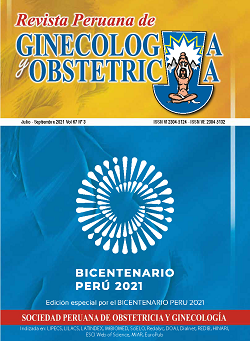The coronavirus conundrum – Covid-19 during the Bicentennial of the Independence of Peru – The postcovid syndrome - The vaccines – The pregnant woman
DOI:
https://doi.org/10.31403/rpgo.v67i2358Keywords:
Coronavirus infections, SARS-CoV-2 virus, complications, Pregnancy, Newborn, Health services accessibilityAbstract
Eighteen months have passed since the COVID-19 infection caused by SARS-CoV-2 was declared a pandemic. There is still no treatment for the virus other than symptomatic and recuperative. The rapid recognition of the novel coronavirus allowed the development of vaccines that are being used on an emergency basis and have led to a decrease in severe cases, hospitalizations, use of intensive care units, mechanical ventilation and deaths. But there are still unknowns about the genetic modifications and variants that the virus uses for better invasion and adaptation to human defenses, as well as about its immediate and long-term consequences in men, women and their children. Herd immunization seems distant to achieve, because we do not know the immunity provided by the infection and vaccines, as well as its duration, and because a large part of the population that does not want to be vaccinated. In addition, there is insufficient vaccine supply capacity, limited accessibility to health services, unfavorable economic situation, increased poverty and its consequences, temporary decrease in life expectancy and other complications secondary to infection by the virus. The present review is a brief account of recent advances in the knowledge and management of COVID-19, at a time when Peru is celebrating the Bicentennial of the country's Independence from Spanish rule, on July 28, 1821, and when Peruvians find themselves in the midst of an aggressive, elusive and deadly pandemic, with human, population, economic and political issues to be resolved.
Downloads
Downloads
Published
How to Cite
Issue
Section
License
Copyright (c) 2021 José Pacheco-Romero

This work is licensed under a Creative Commons Attribution 4.0 International License.
Esta revista provee acceso libre inmediato a su contenido bajo el principio de que hacer disponible gratuitamente la investigación al publico, lo cual fomenta un mayor intercambio de conocimiento global.















